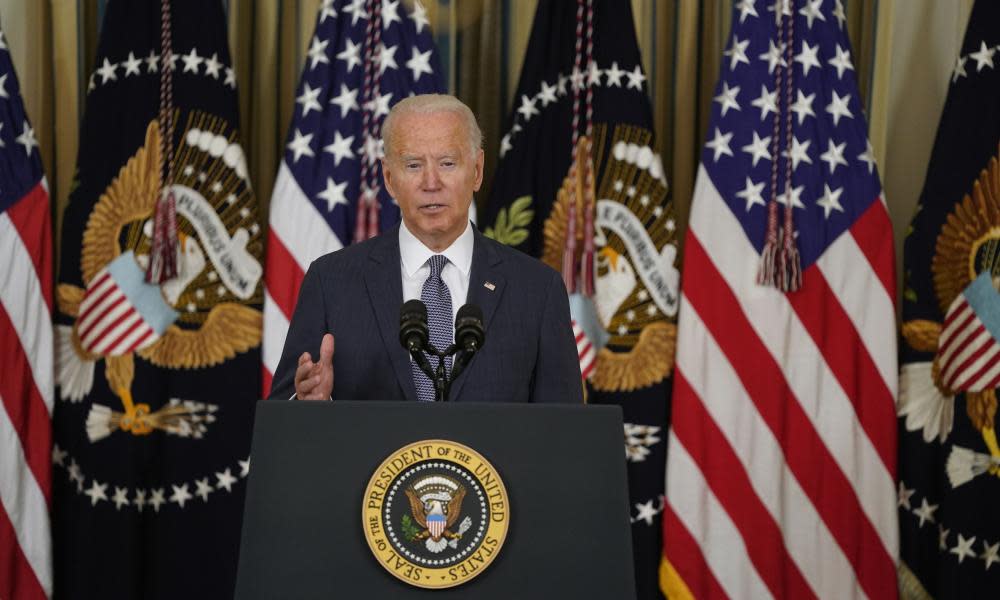Biden targets big tech in executive order aimed at anti-competitive practices

- Oops!Something went wrong.Please try again later.
Joe Biden has signed an executive order targeting anti-competitive practices across the economy that could have major ramifications for America’s largest tech companies.
Friday’s order is the latest of Biden’s actions on anti-trust issues, which have pleased progressives pushing for more action on corporate power – particularly among big tech companies – for years.
Related: ‘Capitalism without competition is exploitation,’ says Biden as he signs order – live
More than a dozen federal agencies will be affected by the order, which includes 72 actions and suggestions meant to “promptly tackle some of the most pressing competition problems across our economy”, the White House said.
At a White House signing ceremony, Biden denounced the current era of business monopolies. “Rather than competing for consumers they are consuming their competitors; rather than competing for workers they are finding ways to gain the upper hand on labor,” he said.
“Let me be clear: capitalism without competition isn’t capitalism. It’s exploitation.”
The latest actions aimed at big tech
The tech measures suggested in the order include restoring net neutrality, re-examining problematic mergers, pushing for rules against excessive corporate surveillance, prevention of unfair termination fees from internet service providers like Verizon and AT&T, and “right to repair” laws.
Biden has called for increased scrutiny of mergers by the leading tech companies, “with particular attention to the “acquisition of nascent competitors, serial mergers, the accumulation of data, competition by ‘free’ products, and the effect on user privacy”.
This could affect prior mergers that were initially approved but have recently come under renewed scrutiny from the US Federal Trade Commission (FTC), including the acquisition of Instagram by Facebook in 2012.
The measures targeting big tech acquisitions come weeks after Biden nominated the anti-trust scholar Lina Khan to the FTC, signaling a renewed effort to target big tech firms.
It also encourages the FTC to limit farm equipment manufacturers’ ability to restrict the use of independent repair shops or do-it-yourself repairs – such as when tractor companies block farmers from repairing their own tractors.
In the order, Biden also encourages the Federal Communications Commission to restore net neutrality, measures that are intended to prevent internet service providers from preferring some content and websites over others, which were rolled back in 2017 under the Trump administration.
However, internet freedom advocates say many of the measures that Biden has encouraged the FCC to take cannot move forward until the administration nominates a fifth commissioner, as the four-person board has been deadlocked in recent years.
Evan Greer, the director of the digital rights organization Fight for the Future, said the administration needs to quickly nominate a commissioner who “doesn’t have ties to the telecom industry and will stand up to the internet service providers, who supports reinstating net neutrality, and who will expand broadband access for everyone”.
“The executive order has a lot of great words, but we need to see some action for those words to mean anything,” she said.
Other industries affected
The order does not only take aim at the tech space – Biden’s efforts to rein in corporate power also extend to his infrastructure plans, as he has called on major companies to pay their “fair share” in taxes to help fund his proposals.
Discussing the need to raise taxes on corporations and the wealthiest Americans, Biden said on Wednesday: “I’m not trying to gouge anybody, but, I mean, just get in the game.”
The order will ban or limit non-compete agreements to make it easier to change jobs and raise wages in certain industries, allow rule changes that would pave the way for hearing aids to be sold over the counter at drugstores, and ban excessive early termination fees by internet companies.
In the airline industry, the administration is requiring companies to provide clear, upfront disclosures about add-on fees and making it easier for customers to get refunds.
The order urges easing the process of switching banks by requiring banks to allow customers to take their financial data with them to another company.
It includes several provisions that could affect the agricultural industry. It calls on the US Department of Agriculture to consider issuing new rules defining when meat can use “Product of USA” labels. Democratic lawmakers and union leaders cheered the order.
Senator Amy Klobuchar, a Minnesota Democrat who chairs the Senate judiciary subcommittee on competition policy, said that Biden’s executive order needed to be buttressed by congressional action.
“Competition policy needs new energy and approaches so that we can address America’s monopoly problem,” Klobuchar said. “That means legislation to update our antitrust laws, but it also means reimagining what the federal government can do to promote competition under our current laws.”
The Associated Press contributed to this report

